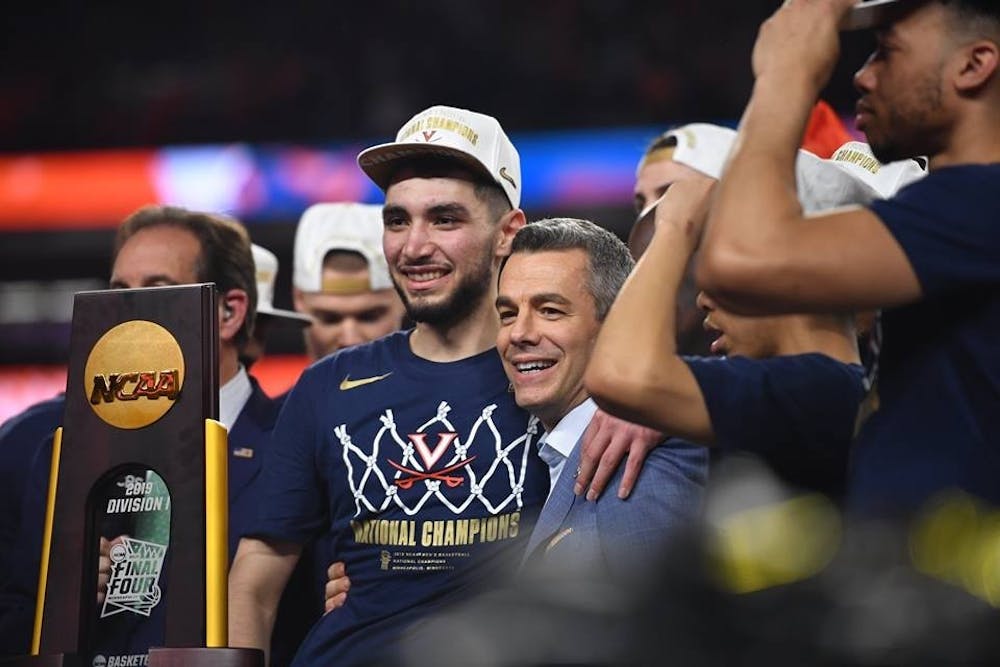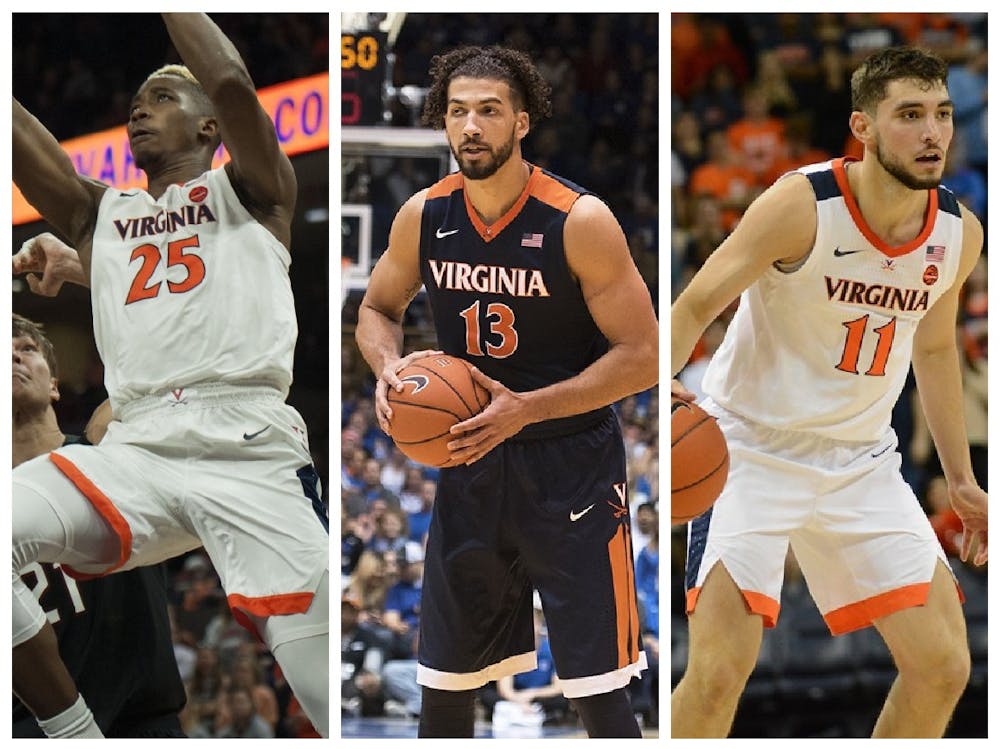In the years since the arrival of Coach Tony Bennett, Virginia men’s basketball has sent many prospects to the NBA. In November, three Cavaliers — two of them being members of the 2019 national championship team — experienced career-altering moves in the NBA.
Guard Ty Jerome was traded from the Phoenix Suns to the Oklahoma City Thunder as part of a deal that sent Abdel Nader and all-pro point guard Chris Paul to Arizona for every available young player and draft pick the Suns had to offer.
Days later, forward Mamadi Diakite was projected by some to be taken somewhere in the second round of the NBA Draft after a stellar two years with the Cavaliers. However, his name was never called. Instead, the Guinea native waited four days after the draft to sign a two-way contract with the Milwaukee Bucks.
Finally, Anthony Gill — an All-ACC third-team forward in 2015 and 2016 — will get his first real crack at the NBA at the age of 28. The Washington Wizards signed Gill to a two-year deal for an undisclosed fee after three seasons with BC Khimki in Moscow.
With all three players in new and exciting situations, it’s worth examining what their roles could be and how they may fit into them when the NBA returns Dec. 22 from an offseason warped by coronavirus.
Ty Jerome - Oklahoma City Thunder

Photo by Christina Anton
One could argue that Jerome was the most important player on the 2019 championship team. He was the lead defender at the point of attack in Bennett’s signature pack-line defense, netting 1.6 steals per contest. He showed playmaking chops by averaging 5.5 assists against just 1.5 turnovers and added good shooting value by making 43.5 percent of his field goals and 39.9 percent of his three-point attempts. Overall, Jerome added 7.2 win shares, a metric that measures how many additional ‘wins’ a player has contributed to the team, which was second only to De’Andre Hunter.
The Philadelphia 76ers selected Jerome 24th overall in the 2019 Draft and then immediately traded him to Phoenix with a quick layover in Boston. In his rookie season, the Virginia product played 31 games for the Suns and three for their G-League affiliate. The results were less than encouraging.
The guard struggled to make his mark in training camp and was inactive for the Suns’ first 18 games. Even once he made his debut, Jerome made little impact for Phoenix. He wasn’t used for large stretches and played just two of the Suns’ eight games inside the NBA Bubble, when Phoenix went 8-0. In the games he did play, Jerome shot poorly from the field, knocking down 38.1 percent of his two-pointers and a ghastly 28 percent of his threes, while averaging 10 minutes per night. On defense, he struggled to adjust to the pace and spacing of the NBA as well as the loss of the elite defenders that accompanied him at Virginia.
It’s also discouraging that the combo guard was unable to find minutes on a young and developing Suns team. However, trading for the veteran Paul signifies Phoenix’s intention to contend now, and Jerome will get a fresh start in a significantly less crowded Oklahoma City backcourt. Shortly after learning of the trade, he tweeted “New Beginnings.” Following a rough rookie season, Jerome could certainly use that new beginning.
At his best, Jerome has the potential to be a “3-and-D” wing — a role player who specializes in three-point shooting and defense — with complementary playmaking skills. That fits well in Oklahoma City where the Thunder lack high level talent as they try to rebuild. Realistically, Jerome should be the fourth or fifth best guard on the team. This means he can still get second-team reps, allowing him to further adjust to the speed of the NBA and shoot himself out of the funk he was in all of last season.
Additionally, older players like point guard George Hill and center Al Horford should be able to offer valuable veteran mentorship. A good year could see Jerome become a key role player in the league. A bad one could lead to him playing in Europe next fall.
Mamadi Diakite - Milwaukee Bucks

Photo by Christina Anton
Jerome had the luxury of getting 328 NBA minutes his rookie season — Diakite might not get any. Many experts had the 23-year-old being selected in the middle of the second round of the draft. Very few expected him to go without hearing his name called at all. Regardless of what happened draft night, Diakite still found a way into the NBA, signing with one of the best teams in basketball.
The Milwaukee Bucks won a league-high 56 regular season games before going into the bubble and falling to the Miami Heat in the Eastern Conference semifinals. Entering this upcoming season, the Bucks’ frontcourt looks stacked. Reigning MVP Giannis Antetokounmpo returns at forward and is joined by seven-footer Brook Lopez, who is nicknamed “Splash Mountain” for his deadly accuracy from deep. The team also signed ex-Knick Bobby Portis to back up the pair and retained the versatile DJ Wilson as an emergency big.
Milwaukee’s championship-caliber roster leaves little room for a developmental prospect like Diakite. The Bucks have no reason to play him while they’re chasing a ring. Due to his two-way contract, Diakite will likely spend the majority of his rookie year with the Wisconsin Herd, Milwaukee’s G-League affiliate. The Bucks’ front office reserves the right to call him up and send him down at will.
Oshkosh, Wisc. may be the best place to ensure the forward develops into an NBA-caliber player on both ends of the floor. Defensively, he’s smart, long, disruptive and has a ridiculous motor that often results in insane highlights. He can defend guards on the perimeter or tangle with seven-footers in the paint thanks to his 7-foot-3 wingspan. Game reps against lesser competition should prepare him for the pace and intensity of professional basketball without forcing him to guard superstars night in and night out.
Diakite’s offensive game is primitive, but not exactly out of sync with the modern NBA. He does two things well — shoot three-pointers and dunk. He shot 36.4 percent from beyond the arc on 1.8 attempts per game and 75.4 percent from the charity stripe during his senior season — both indicators of future shooting success — and developed great chemistry with Jerome and junior guard Kihei Clark.
Outside of those two things, though, Diakite struggles. He has little playmaking skill, turning the ball over nearly four times for every assist in the 2019-20 season. Diakite also displayed minimal ballhanding ability in four years at Virginia. The same could be said for his post game, where too often he’d chuck up weak fadeaways late in the clock. On top of that, at 6-foot-9 and 224 pounds, he is physically underdeveloped and routinely struggled to finish through contact.
Fortunately, the modern NBA allows for some of those flaws. If he fulfills his promise as a true do-it-all defender and further improves his shooting stroke, some team will give him a chance as a role player. Players that can shoot and defend are always valuable. But for now, expect him to spend a lot of the 2020-21 season in a gym in Oshkosh, getting stronger and pushing for a better role.
Anthony Gill - Washington Wizards

Photo by Marshall Bronfin
Gill went undrafted out of Virginia despite averaging 13.8 points and 6.1 rebounds per game in his senior season. This puzzled many casual observers as Gill also set the school record for career field-goal percentage and was a dedicated defender.
However, the aforementioned numbers distract from the holes in Gill’s game. Like Diakite, his playmaking was non-existent as he never topped 30 assists in any season in Charlottesville. At South Carolina, he seemed to be a promising shooter, knocking down 40 percent of his 28 triples as a freshman. After transferring, though, he attempted just three more in three years.
The 2016 NBA Draft came and went without Gill finding an opportunity in the NBA, so he trekked to Europe to ply his trade. After a season on the Turkish team Yeşilgiresun Belediye, he got the call from the Charlotte Hornets’ Summer League squad. After a frustrating summer in Las Vegas, the North Carolina native signed for Khimki.
In three seasons in Russia, Gill played solid ball off the bench, redeveloping his three-point stroke — he shot 44 percent in 2019-20 before sustaining a foot injury — while maintaining the offensive efficiency he displayed at Virginia with a 65 percent effective field goal percentage.
After demonstrating his value in Europe, Gill got his first big break in late November when the Wizards pulled him from the bargain bin. He will more than likely start the season with Washington’s G-League affiliate, the Capital City Go-Go. There, he will join his former teammate and groomsman, point guard London Perrantes. This will hopefully help him adjust to American basketball again.
Unfortunately, the path to NBA playing time in Washington will be long and difficult for Gill. In front of him on the depth chart are second-year stud Rui Hachimura, 2020 ninth-overall pick Deni Avdija, the recently re-signed Davis Bertans and young athletes Troy Brown Jr. and Isaac Bonga. That’s a lot of talent for a 28-year-old without a real positional fit to fight through and Washington has more invested in any of them than Gill.
Unless he gets lucky or shows incredible mid-career improvement, look for Gill to spin this assignment into a spot at a EuroLeague club more desirable than Khimki in the future. 2020 will almost certainly be Gill’s last real shot at the NBA.
There are currently nine former U.Va. basketball players in the NBA: Justin Anderson (Philadelphia 76ers), Malcolm Brogdon (Indiana Pacers), Mamadi Diakite (Milwaukee Bucks), Anthony Gill (Washington Wizards), Kyle Guy (Sacramento Kings), Joe Harris (Brooklyn Nets), De'Andre Hunter (Atlanta Hawks), Ty Jerome (Oklahoma City Thunder), and Mike Scott (Philadelphia 76ers).







